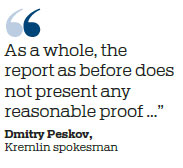Mueller drops obstruction dilemma
Probe tears Washington apart and casts shadow over the White House
The much-anticipated report by US special counsel Robert Mueller on the Russia probe has been made public, but the fight over the probe is unlikely to end, Xinhua News Agency said in an analysis.
Though the US Justice Department redacted certain information, it still provides a clearer picture of the nearly two-year investigation that has cast a shadow over the White House and torn Washington apart, Xinhua said.
Russia on Friday once more dismissed the Mueller report, saying that it failed to present evidence of any meddling by Moscow in the 2016 US election, Agence France-Presse reported.

"As a whole, the report as before does not present any reasonable proof at all that Russia allegedly meddled in the electoral process in the US," Kremlin spokesman Dmitry Peskov told journalists, saying it contained "no new information".
The 448-page report states that there was no evidence that US President Donald Trump's campaign conspired with the Russian government during the 2016 presidential election, but didn't conclude if the president had obstructed justice.
Mueller instead recounts 10 episodes in his report involving Trump and discusses potential legal theories for connecting these actions to elements of an obstruction offense. It is Attorney General William Barr and his deputy, Rod Rosenstein, who concluded that the special counsel did not have "sufficient" evidence to support a charge.
It's now up to Congress to decide what to do with Mueller's findings about Trump. The report provides fresh evidence of Trump's interference in the Russia probe, challenging lawmakers to respond. The risks for both parties are clear if they duck the responsibility or prolong an inquiry that, rather than coming to a close, may be just beginning, The Associated Press said.
For Trump and his political allies, the report is enough for exoneration, while for Democrats the lengthy document has raised a lot of questions and fueled their concern.
How far lawmakers will go, though, remains unclear. Republicans are eager to push past the investigation. And while Democrats say Mueller's findings are far more serious than initially indicated, they've been hesitant to pursue impeachment, AP said.
"The report is generating very different reactions on the various sides of the political aisle," Darrell West, a senior fellow at the Brookings Institution, a Washington-based think tank, told Xinhua.
"Republicans think it exonerates the president, while many Democrats believe it is incomplete because Trump didn't answer all the relevant questions," West said.
"The release is not likely to quiet the partisan divide on how people respond to Trump."
The president's testimony to Mueller showed that he repeatedly responded to inquiries with brief denials or lack of recollection on wide-ranging topics, saying more than 30 times he did not recall, remember or recollect.
Mueller's report says he had the authority to issue a grand jury subpoena in order to interview Trump but decided not doing so because it would delay the probe, citing that his team "had sufficient evidence to understand relevant events and to make certain assessments without the president's testimony".
Jerry Nadler, chairman of the House Judiciary Committee, said on Thursday that he'll be issuing a subpoena for the full report, reportedly as soon as Friday, though the Justice Department has promised to provide a group of bipartisan lawmakers a less-redacted version in the coming two weeks.
Christopher Galdieri, assistant professor at Saint Anselm College, said that it's too soon to tell how damaging the report is to the White House, as "perceptions of Trump in the public at large and among other Washington players are pretty much set at this point."
He predicted that the White House would "try to distract voters from this" and the president would send a storm of tweets in the coming days.
(China Daily 04/20/2019 page8)














